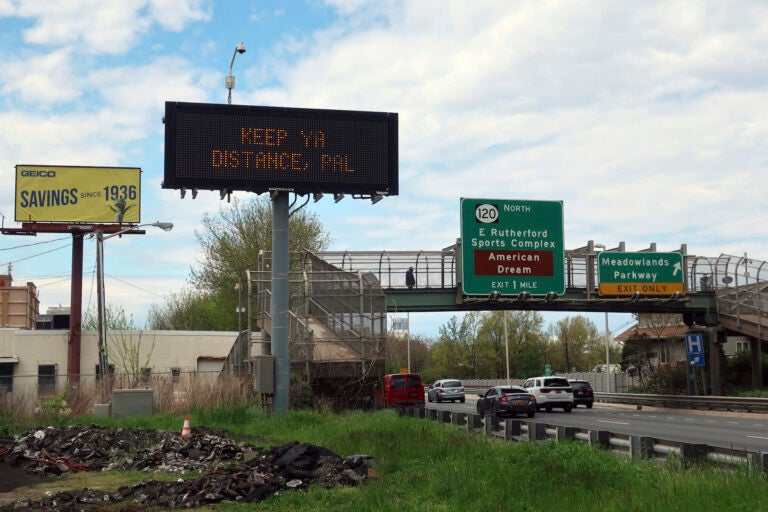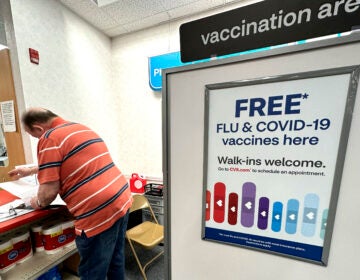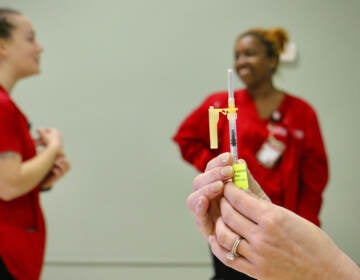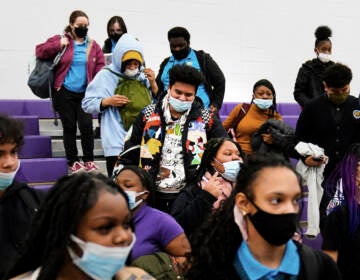Coronavirus update: N.J. tops 10,000 deaths, sets rules for July 7 primary
Gov. Phil Murphy also said hospitals could resume elective produce on May 26, while the state will hold grand jury proceedings over Zoom.

A sign reminds people to social distance during the coronavirus pandemic in Secaucus, New Jersey, on Monday, May 4, 2020. (AP Photo/Ted Shaffrey)
Are you on the front lines of the coronavirus? Help us report on the pandemic.
New Jersey reported 1,297 new coronavirus cases Friday, bringing the state’s total to 143,905.
Another 201 people died of complications from COVID-19. The state has now lost 10,138 residents to the pandemic.
Gov. Phil Murphy compared the New Jerseyans who succumbed to the virus to those who sacrificed their lives during America’s wars, were killed on 9/11 or in natural disasters like Superstorm Sandy.
“We hold them and always will in a special place,” Murphy said. “And we will hold each one of these lives lost in this pandemic in a special place.”
A mix of in-person and mail voting for July 7 primary
In-person voting will be allowed for New Jersey’s July 7 primary, Murphy said Friday, even though he expects votes to be cast “primarily” using mail-in ballots.
Ahead of the election, all registered Republican and Democratic voters will be sent postage-paid vote-by-mail ballots, he said, while unaffiliated voters will be sent postage-paid applications for such ballots.
At the same time, Murphy said each municipality would have to open at least one in-person polling location. Counties would have to open “at least 50% of the overall normal locations.”
The governor also said social-distancing protocols would be enforced at those locations, including the sanitation of touch-screen voting machines after each person.
“Our goals are two-fold: to maximize our democracy while minimizing the risk of illness,” Murphy said.
Murphy’s announcement came three days after local races in about 30 municipalities — conducted entirely through the mail for the first time in state history — were marred by accusations of fraud in Paterson and Irvington.
Murphy said Friday that counties and the U.S. Postal Service would set up secure drop boxes for voters to turn in their ballots, which must be postmarked by the day of the election to be counted.
The July 7 primary was originally set for June 2 but delayed as officials grappled with the coronavirus pandemic.
Elective procedures to resume May 26
New Jersey hospitals are no longer on a “crisis footing” and can resume elective and other invasive procedures starting May 26, Murphy said Friday.
“Allowing for these procedures to resume is a big step forward for public health, and we’re able to do this on May 26 because the data we receive daily from within our hospitals says we can,” he said, referring to declining numbers of COVID-19 patients in hospitals and on ventilators.
The move is also good for hospitals’ finances. Despite being taxed by an influx of COVID-19 patients in recent months, many hospitals have struggled without the significant revenue generated by elective procedures.
“My past life would tell you that if you don’t do over, like, 50% elective surgeries in your hospital you’re going to have difficulty managing your finances,” Health Commissioner Judith Persichilli, who worked as a nurse before becoming a health care executive, said in March.
Persichilli said Friday that hospitals will have to adopt several new protocols to protect against the spread of the virus, including testing patients for COVID-19 three days before their surgery and screening them for symptoms the day of.
Those who are infected should not have a procedure unless it’s an emergency, she said.
The state Department of Health is due to issue additional guidance on Monday.
N.J. to try virtual grand juries
In the same week that municipal courts were given the green light to resume remote proceedings, New Jersey Chief Justice Stuart Rabner announced the state will also experiment with virtual grand juries using Zoom.
That may take some of the sting out of being selected for grand jury duty, which can require residents to travel to a courthouse weekly over the course of months. Now, those selected can serve from the comfort of their homes.
Court officials acknowledged the format may present novel security risks and said they will use “additional security measures.” They will also require jurors to take a supplemental oath not to record the grand jury proceedings or allow anyone else to watch them.
In-person jury trials and grand juries were suspended March 12, but some 1,400 defendants are now detained in county jails awaiting indictment. A Judiciary spokesperson did not immediately clarify how that compares to pre-pandemic levels.
The virtual grand juries will begin by the end of the month in Bergen and Mercer counties, Rabner said, and expand to other counties if successful. The format will not be used unless defendants consent.
Selected jurors who lack the necessary technology will be provided laptops or tablets by the court, Rabner said in a Supreme Court order.
WHYY is your source for fact-based, in-depth journalism and information. As a nonprofit organization, we rely on financial support from readers like you. Please give today.



![CoronavirusPandemic_1024x512[1]](https://whyy.org/wp-content/uploads/2020/03/CoronavirusPandemic_1024x5121-300x150.jpg)



